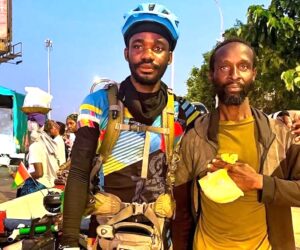President Bola Ahmed Tinubu has ordered the immediate withdrawal of police officers assigned as escorts and guards to Very Important Persons (VIPs) nationwide. The officers are to return to core policing duties in communities that lack an adequate security presence.
The directive was issued during a high-level security meeting held at the State House in Abuja on Sunday and confirmed by the Special Adviser to the President on Information and Strategy, Bayo Onanuga.
According to the presidency, VIPs who still require escorts will no longer rely on the Nigeria Police Force (NPF) for protection but must officially apply for personnel from the Nigeria Security and Civil Defence Corps (NSCDC).
The attendees at Sunday’s meeting comprised the Chief of Army Staff, Lt Gen Waidi Shaibu; the Chief of Air Staff, Air Marshal Sunday Kelvin Aneke; the Inspector-General of Police, Kayode Egbetokun; and the Director-General of the DSS, Tosin Adeola Ajayi.
Read Next: 38 Worshippers Abducted in Kwara Regain Freedom as Tinubu Vows Not to Relent
The President has repeatedly insisted that many underserved and remote areas across the country do not have adequate policing. At the same time, thousands of officers remain attached to politicians, business elites and wealthy individuals.
According to a statement released by the President’s Special Adviser on Information and Strategy, Bayo Onanuga:
Not all thrillers are built the same. Learn the differences between psychological, crime, political and sci-fi thrillers with examples that bring each one alive.
Payroll officers handle this automatically, but understanding how to calculate PAYE tax yourself helps you confirm that your deductions are correct.
This is not the first time the withdrawal of police escorts from VIPs has been announced. Implementation has always been inconsistent.
Many parts of Nigeria, especially remote areas, have few policemen at the stations, thus making the task of protecting and defending the people difficult. In view of the current security challenges facing the country, President Tinubu is eager to boost police presence in all communities.
Onanuga also announced the President’s plans to recruit 30,000 additional police officers and upgrade police training facilities through partnerships with state governments.
Read Next: ‘This Is Terrorism!’- Aproko Doctor, Other Celebrities React to Kwara Church Attack, Demand Action
A History of Withdrawals
This is not the first time the withdrawal of police escorts from VIPs has been announced, but implementation has always been the problem, not policy.
Below is a timeline of previous withdrawal orders and why they happened:
1. 2003 – Tafa Balogun’s Withdrawal, U‑Turn, and Backlash
In 2003, IGP Mustafa “Tafa” Adebayo Balogun made headlines by ordering the withdrawal of police orderlies from judicial officers and politicians. He argued that too many officers were being diverted to personal protection duties, undermining effective policing.
However, the move was controversial. Judges and political leaders pushed back. The Chief Judge of the Federal Capital Territory, Justice Lawal Gummi, publicly condemned the directive, saying it endangered court functions.
Within a month, Balogun partially reversed the order: on October 13, 2003, he reinstated the police orderlies to their positions as judges.
Read Next: 50 Children of Niger State Catholic School Escape From Kidnappers; Over 200 Still Missing
2. 2009 – Onovo’s Short‑Lived Reform
A few years later, in August 2009, IGP Ogbonnaya Onovo announced that all police personnel serving as private orderlies should return to their bases. He explicitly warned that “any policeman or woman who continues in such duty will be dismissed forthwith and delisted.”
But the directive did not last: within a short time, Onovo partially walked back his own order, allowing some high-profile individuals (including wives of governors and other VIPs) to retain orderlies.
Read Next: Terrorists Attack Catholic School in Niger; Students, Staff Abducted
3. 2010 – Ringim’s Threats and Monitoring Unit
When IGP Hafiz Ringim assumed leadership in 2010, he renewed the push for reform. He warned that officers who refused to return from VIP duties “would be arrested, delisted and prosecuted.”
The police spokesman at the time, Emmanuel Ojukwu, said a special monitoring unit would be established to enforce the order. Still, the directive collapsed like a pack of cards soon after.
4. 2012 – Abubakar Cancels All Private Guards
In February 2012, Acting IGP Mohammed Abubakar took a bold step: he cancelled all approved police guards for private individuals and corporate bodies.He framed the move as part of a broader effort to restore “professionalism, integrity and lost glory” to the Nigeria Police Force.
Read Next: Nnamdi Kanu Escapes Death Penalty, Bags Life Imprisonment For Terrorism Offences
5. 2016 – Arase Wants Redeployment to Core Policing
IGP Solomon Arase, during a public appearance in March 2016, lamented that Nigeria was “grossly under‑policed.”
He argued that too many officers were posted as personal orderlies, and he ordered: “policemen on postings as orderlies to individuals, including politicians, be withdrawn immediately and redeployed to other more sensitive posts …”
He made this case in the context of bolstering security across communities rather than privileging a few.
6. March 2018
In March 2018, IGP Ibrahim Idris issued a sweeping directive: “the withdrawal of all police officers deployed to VIPs, political and public office holders, with immediate effect.”
He said the order would help streamline deployment to improve “effective and efficient policing” of Nigeria.
Read Next: US Lawmakers Disagree Over Trump’s Action Against Nigeria
7. 2020 – Adamu’s Partial Retreat Amid Protests
On October 21, 2020, IGP Mohammed Adamu ordered the withdrawal of all police personnel attached to VIPs.
But he carved out important exemptions: “those attached to Government Houses, the Senate President, and the Speaker of the House of Representatives” were excluded from the order. Adamu’s move came shortly after the controversial disbanding of SARS, during a highly charged moment of public scrutiny of policing.
8. 2023 – Egbetokun Pulls PMF from VIP Duties
In June 2023, Acting IGP Kayode Egbetokun announced that Police Mobile Force (PMF) officers would no longer perform VIP escort and guard duties.
He also said a special committee has been created to implement and enforce the policy, and that Special Protection Unit (SPU) officers would replace PMF in key areas where necessary. In July 2023, the police force later reaffirmed: “the decision … stands firm, and there will be no going back.”
Despite the announcement, there was some clarification: the Force Public Relations Officer Muyiwa Adejobi later explained that the move applied specifically to PMF personnel — not all police officers assigned to VIPs.
Later that year, in November, President Bola Ahmed Tinubu was said to have directed the withdrawal of police escorts from VIPs as part of a broader policing reform.
Read Next: ‘I’m Depressed…’ – Tinubu Reacts to Killings, Abductions; Postpones Foreign Trips
This supposed directive aligned with his campaign promise to push community-based policing and reduce misuse of security resources by wealthy individuals.
9. April 22, 2025 — Police Diversion Again Challenged
In April 2025, IGP Egbetokun revisited the same issue, this time emphasising the harmful impact of diverting tactical units from operational duties.
He stated that VIP escort assignments had become “a distraction” for PMF officers, limiting their readiness for emergencies. The announcement was stricter than the previous one, but again, implementation was weakened by exceptions granted to politically connected individuals.
Despite these orders, enforcement has been weak, as many VIPs have continued to retain police escorts through political influence or unofficial arrangements.
Over the course of more than two decades, repeated IGP directives have tried to scale back police protection duties for VIPs or political figures. But in many cases, implementation has been weak or short-lived.
Orders have often been praised rhetorically as part of reform or professionalisation, yet they have sometimes been watered down or reversed amid resistance.
The pattern suggests that while the idea of reducing VIP protection enjoys cross‑administration support, enforcing it remains a persistent challenge, often because of entrenched power structures and the high value placed on security details by the elite.
Many Nigerians are hopeful that the redeployment will translate into faster police response and improved presence in neighbourhoods where lawlessness has grown.


&format=jpeg)
![How to Calculate Tax on Your Salary in Nigeria: 2026 Easy Guide. [Getty Images]](https://image.api.sportal365.com/process/smp-images-production/pulse.ng/26072024/a77466d2-ea00-4ca6-ae55-046eb945bbba?operations=autocrop(140:79)&format=jpeg)
&format=jpeg)





